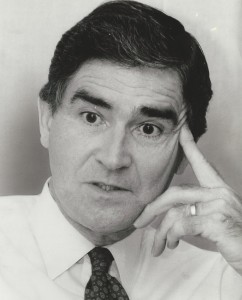Over his 40-year career as an anchorman in Chicago, John Drury was never known as a controversial figure. His warm demeanor and unruffled delivery belied a sharp-edged competitiveness that viewers rarely saw.
But one Saturday afternoon 25 years ago, the legendary broadcaster let his guard down and went on the offensive against critics in the print media. Editors of the Chicago Tribune and Sun-Times, Drury charged, were guilty of many of the excesses they attack in television news.
“Newspapers are always the first to point the finger,” he told an audience assembled for "An Afternoon with John Drury" at the Museum of Broadcast Communications. “Some of the criticism we get for doing the same things they do on a daily basis seems unfair.”
Drury retired from ABC-owned WLS-Channel 7 in 2002. He died of Lou Gehrig’s disease in 2007 at 80.
Here is my Sun-Times column of March 26, 1990. (Posted with permission.)
John Drury rips local newspapers for TV criticism
Chicago’s most prominent television newsman has lashed out at the city’s two major newspapers for sins ranging from exploitation to hypocrisy.
John Drury, principal anchor of WLS-Channel 7’s top-rated 5 and 10 p.m. newscasts, told a gathering of fans at the Museum of Broadcast Communications: “You could take the Chicago Tribune or the Sun-Times and pick it apart on daily basis for some of the exploitative things they do and some of the things they do to increase circulation. They damn us for doing the same things they do.”
Drury’s broadside against the print media, delivered March 10, followed a seemingly innocuous question about the silly stories aired on local newscasts during ratings sweeps months. This column obtained a tape of his remarks last week.
“You know, just because we do hard news all the time doesn’t mean we can’t do something that’s entertaining or grabs someone’s attention. Newspapers do it all time,” Drury told the museum audience.
“Newspapers are always the first to point the finger. But we learned it from newspapers — the crossword puzzles, the latest rock star, the feature magazines that sound like boxes of soap, like ‘Tempo’ and ‘Now’ and the rest of these things.
“Newspapers took the consultants that we were damned for using at one time, changed their newspapers and practiced something called ‘market journalism.’ In other words, you find out what the market wants and you give it to them, rather than the old-time journalism [which] was: ‘All the news that’s fit to print’ and ‘We’re gonna tell you what we think are the most important things in the world.’
“A lot of that [criticism of television news] now is just newspaper stories, as far as I’m concerned. They would like us to be pristine, and yet we have very few journalism reviews that look at newspapers. . . . They don’t run their investigative stories in the middle of the summer when no one’s reading newspapers and they’re all away on vacation. They run them when they know people are at home or before an election. You put your best foot forward. If you’ve got an investigative story, why wouldn’t you hold it so the maximum amount of people will see it?
“It’s only a one-way street. We get all this criticism. . . . I’ve always felt that television criticism is one advertising medium criticizing another advertising medium, rather than a real constructive ‘Let’s make it better’ [approach].
“A lot of things that happen in television I blush at. And they should be noted. [But] some of the criticism we get for doing the same things they do on a daily basis seems unfair.”
Drury, 63, a respected 28-year veteran of Chicago television news, said in a subsequent interview that he has had no second thoughts since making his comments. He confirmed the accuracy and context of his quotes.
“I don’t know how my remarks will be taken, but I really can’t worry about that,” he said. “You have to state how you feel, and that’s what I did. If you feel you’re speaking the truth, why worry about it?”



